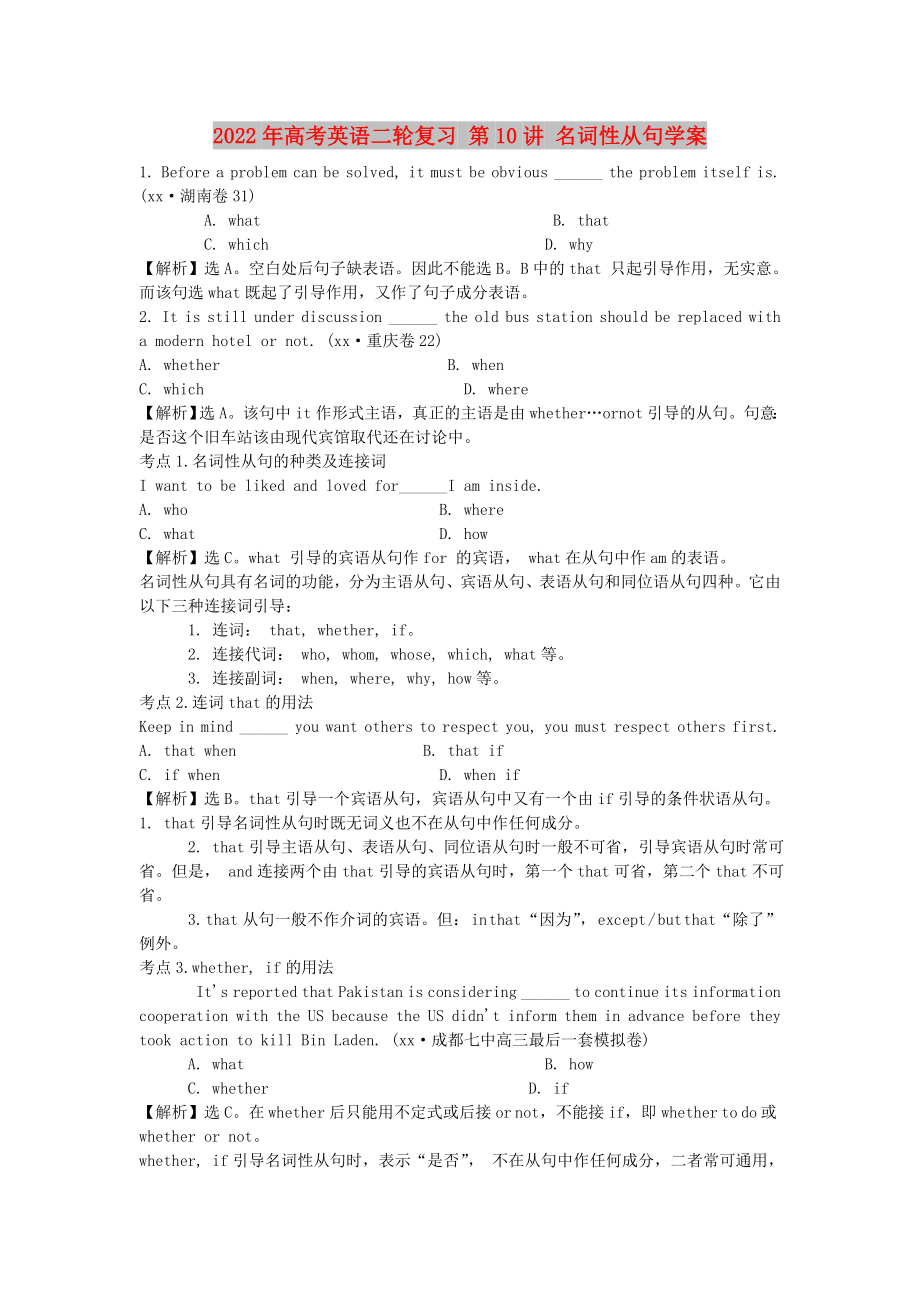《2022年高考英語(yǔ)二輪復(fù)習(xí) 第10講 名詞性從句學(xué)案》由會(huì)員分享��,可在線閱讀���,更多相關(guān)《2022年高考英語(yǔ)二輪復(fù)習(xí) 第10講 名詞性從句學(xué)案(3頁(yè)珍藏版)》請(qǐng)?jiān)谘b配圖網(wǎng)上搜索�。
1��、2022年高考英語(yǔ)二輪復(fù)習(xí) 第10講 名詞性從句學(xué)案
1. Before a problem can be solved, it must be obvious ______ the problem itself is. (xx·湖南卷31)
A. what B. that
C. which D. why
【解析】選A�����?�?瞻滋幒缶渥尤北碚Z(yǔ)��。因此不能選B��。B中的that 只起引導(dǎo)作用�,無(wú)實(shí)意。而該句選what既起了引導(dǎo)作
2���、用,又作了句子成分表語(yǔ)�。
2. It is still under discussion ______ the old bus station should be replaced with a modern hotel or not. (xx·重慶卷22)
A. whether B. when
C. which D. where
【解析】選A。該句中it作形式主語(yǔ),真正的主語(yǔ)是由whether…or not引導(dǎo)的從句�。句意:是否這個(gè)舊車站該由現(xiàn)代賓館取代還在討論中。
3�、
考點(diǎn)1.名詞性從句的種類及連接詞
I want to be liked and loved for______I am inside.
A. who B. where
C. what D. how
【解析】選C。what 引導(dǎo)的賓語(yǔ)從句作for 的賓語(yǔ)�����, what在從句中作am的表語(yǔ)���。
名詞性從句具有名詞的功能�����,分為主語(yǔ)從句�����、賓語(yǔ)從句����、表語(yǔ)從句和同位語(yǔ)從句四種��。它由以下三種連接詞引導(dǎo):
1. 連詞: that, whether, if��。
4、 2. 連接代詞: who, whom, whose, which, what等����。
3. 連接副詞: when, where, why, how等。
考點(diǎn)2.連詞that的用法
Keep in mind ______ you want others to respect you, you must respect others first.
A. that when B. that if
C. if when D. when if
【解析】選B�����。that引導(dǎo)一個(gè)賓
5���、語(yǔ)從句�,賓語(yǔ)從句中又有一個(gè)由if引導(dǎo)的條件狀語(yǔ)從句�。
1. that引導(dǎo)名詞性從句時(shí)既無(wú)詞義也不在從句中作任何成分。
2. that引導(dǎo)主語(yǔ)從句���、表語(yǔ)從句��、同位語(yǔ)從句時(shí)一般不可省����,引導(dǎo)賓語(yǔ)從句時(shí)?��?墒?。但是��, and連接兩個(gè)由that引導(dǎo)的賓語(yǔ)從句時(shí)��,第一個(gè)that可省��,第二個(gè)that不可省���。
3. that從句一般不作介詞的賓語(yǔ)���。但: in that “因?yàn)椤保?except / but that“除了”例外。
考點(diǎn)3.whether, if的用法
It's reported that Pakistan is considering _____
6����、_ to continue its information cooperation with the US because the US didn't inform them in advance before they took action to kill Bin Laden. (xx·成都七中高三最后一套模擬卷)
A. what B. how
C. whether D. if
【解析】選C。在 whether后只能用不定式或
7��、后接or not���,不能接if�����,即whether to do 或whether or not�����。
whether, if引導(dǎo)名詞性從句時(shí)��,表示“是否”�����, 不在從句中作任何成分�����,二者?��?赏ㄓ?,但在下面幾種情況下一般只用whether:
(1)引導(dǎo)主語(yǔ)從句���。
(2)引導(dǎo)表語(yǔ)從句��。
(3)引導(dǎo)同位語(yǔ)從句�。
(4)在動(dòng)詞discuss之后��。
(5)在介詞之后����。
(6)后面緊跟or not�����。
(7)動(dòng)詞不定式前。
考點(diǎn)4.名詞性從句的語(yǔ)序
I really wonder ______ will sto
8��、p Japan from its annual whale hunt in the Antarctic. (山西太原五中xx— xx學(xué)年度第二學(xué)期月考4月)
A. that it is what B. what it is that
C. what is it that D. that is it what
【解析】選B�����?��?瞻滋帪橐毁e語(yǔ)從句作動(dòng)詞wonder的賓語(yǔ)�。而賓語(yǔ)從句是一個(gè)強(qiáng)調(diào)句��,強(qiáng)調(diào)what����。賓語(yǔ)從句要采用陳述語(yǔ)序。
名詞性從句用陳述語(yǔ)序�����,為:連詞(+被修
9、飾語(yǔ))+主語(yǔ)+謂語(yǔ)����。即主謂不倒裝。
考點(diǎn)5. what與that引導(dǎo)名詞性從句的區(qū)別
例1:It is not always easy for the public to see ______ use a new invention can be of to human life. (xx·重慶卷34)
A. Whose B. what
C. which D. that
【解析】選B���?�?瞻滋幾鲃?dòng)詞 see 的賓語(yǔ)�。賓語(yǔ)從句按順序?yàn)?/p>
10���、a new invention can be of what use to human life�����,疑問(wèn)詞what前置���。因此選B。
例2:Modern science has given clear evidence ______ smoking can lead to many diseases. (xx·天津卷13)
A. what B. which
C. that D. where
【解析】選C�。that引導(dǎo)詞作名詞evidence的同位語(yǔ)從句引導(dǎo)詞。該詞只起引導(dǎo)作
11�����、用,無(wú)實(shí)義����,不可省略。
1. 在名詞性從句中���,that只起連接主句和從句的作用,在從句中不充當(dāng)任何成分���,本身也沒(méi)有詞義�,即從句中不缺少任何成分時(shí)用連詞that.
2. that在從句中作主語(yǔ)時(shí)通常用it作形式主語(yǔ)�����,而將that從句置于句末作真正的主語(yǔ)����。但what不能用it作形式主語(yǔ)。
3. that可引導(dǎo)同位語(yǔ)從句��,但what不能��。
考點(diǎn)6.由reason作主語(yǔ)時(shí),表語(yǔ)從句的連接詞
The reason why he can't go to school is ______ he is ill.
A. because
12���、 B. why
C. that D. which
【解析】選C��。reason作主語(yǔ)時(shí)��,其后的表語(yǔ)從句一般用連詞that�����。
reason作主語(yǔ)時(shí)�����,表語(yǔ)從句所用連詞為that, 一般不用because或why等��。
考點(diǎn)7. that引導(dǎo)同位語(yǔ)從句和定語(yǔ)從句的區(qū)別
例1:______ was known to all that William had broken his promise ______ he would never play puter games again. (
13���、xx·湖南雅禮中學(xué)高三第8次月考卷)
A. As; which B. As; that
C. It; that D. What; that
【解析】選C。it作形式主語(yǔ)��,第一個(gè)that后引導(dǎo)從句作真正主語(yǔ)����。名詞promise后接that引導(dǎo)的同位語(yǔ)從句��。對(duì)前一名詞內(nèi)容進(jìn)一步補(bǔ)充說(shuō)明����。
例2:Helping others is a habit, one ______ you can learn even at an early age. (xx·山東
14��、卷改編)
A. it B. that
C. what D. who
【解析】選B����。one是a habit的同位語(yǔ)。作為定語(yǔ)從句的先行詞���,后用which或 that作定語(yǔ)從句動(dòng)詞learn的賓語(yǔ)。關(guān)系代詞作賓語(yǔ)也可省略��。
that引導(dǎo)同位語(yǔ)從句時(shí)�����, that在從句中不作成分(一般不省), 且不可用which來(lái)取代��;that引導(dǎo)定語(yǔ)從句時(shí)��, that須作主語(yǔ)�、賓語(yǔ)或表語(yǔ)(作賓語(yǔ)時(shí)常可省), 且常可用which來(lái)取代���。
 2022年高考英語(yǔ)二輪復(fù)習(xí) 第10講 名詞性從句學(xué)案
2022年高考英語(yǔ)二輪復(fù)習(xí) 第10講 名詞性從句學(xué)案

